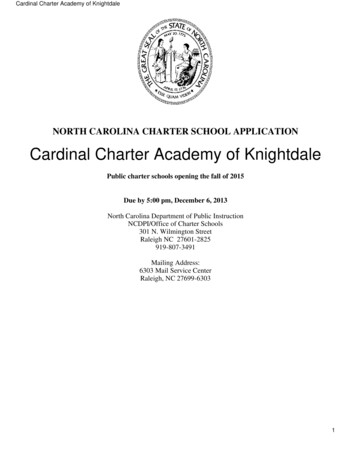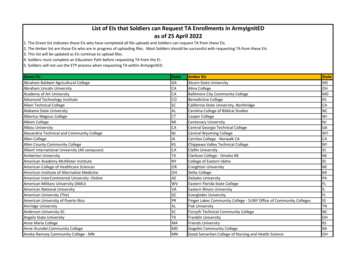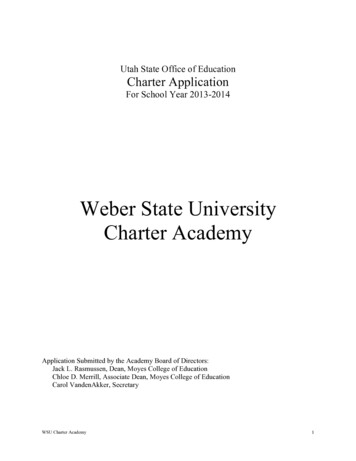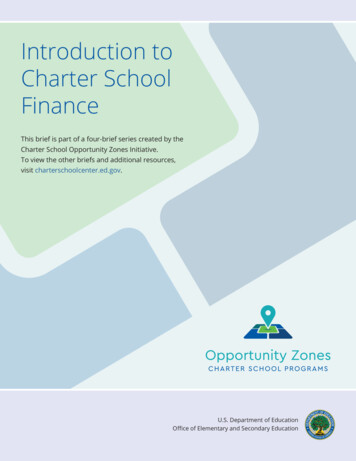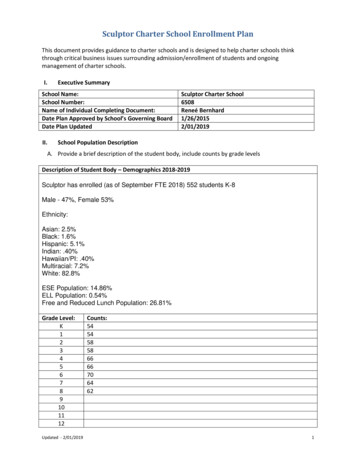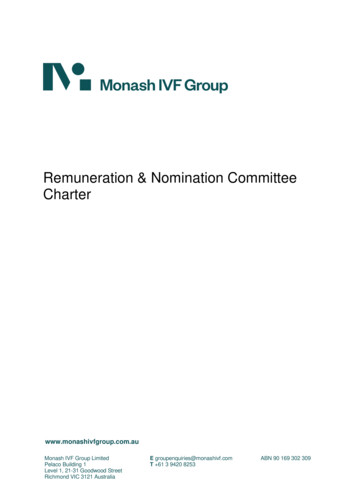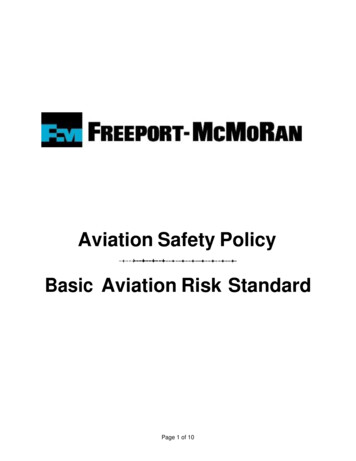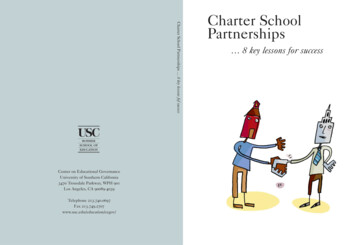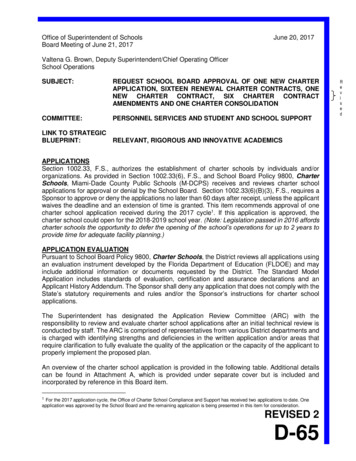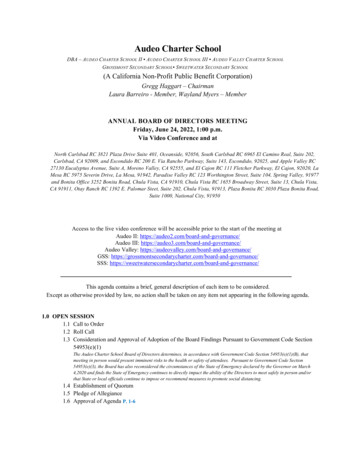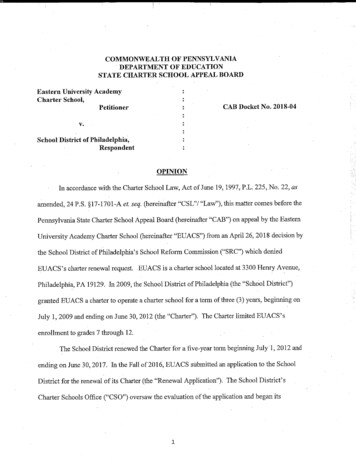
Transcription
COMMONWEALTH OF PENNSYLVANIADEPARTMENT OF EDUCATIONSTATE CHARTER SCHOOL APPEAL BOARDEastern University AcademyCharter School,PetitionerCAB Docket No. 2018-04v.School District of Philadelphia,RespondentOPINIONIn accordance with the Charter School Law, Act of June 19, 1997, P.L. 225, No. 22, asamended, 24 P.S. §17-1701-A et. seq. (hereinafter "CSL"/ "Law"), this matter comes before thePennsylvania State Charter School Appeal Board (hereinafter "CAB") on appeal by the EasternUniversity Academy Charter School (hereinafter "EUACS") from an April 26, 2018 decision bythe School District of Philadelphia's School Reform Commission ("SRC") which deniedEUACS's charter renewal request. EUACS is a charter school located at 3300 Henry Avenue,Philadelphia, PA 19129. In 2009, the School District of Philadelphia (the "School District")granted EUACS a charter to operate a charter school for a term of three (3) years, beginning onJuly 1, 2009 and ending on June 30, 2012 (the "Charter"). The Charter limited EUACS'senrollment to grades 7 through 12.The School District renewed the Charter for a five-year term beginning July 1, 2012 andending on June 30, 2017. In the Fall of 2016, EUACS submitted an application to the SchoolDistrict for the renewal of its Charter (the "Renewal Application"). The School District'sCharter Schools Office ("CSO") oversaw the evaluation of the application and began its1
evaluation in the Fall of 2016 by collecting data, conducting site visits and developing a RenewalRubric through which it assigned weights to information submitted by EUACS.on or about June 1, 2017 in whichit recommendedThe CSO published a Renewal Report.that the Charter not be renewed. The SRC thereafter passed Resolution SRC-8 (the "NonrenewalNotice") on June 15, 2017 after finding substantial grounds for the nonrenewal ofthe EUACSCharter based upon approximately fifty-five (55) purported deficiencies. The SRC directed thata public hearing be conducted to address the CSO' s recommendation not to renew the Charter.The School District appointed a Hearing Officer to conduct public hearings and issue a proposedreport.Hearings were held over the course of 14 days, from October 9, 2017 through December20, 2017. The hearing record remained open until January 19, 2018 for public comment. TheHearing Officer issued his proposed report on March 14, 2018 in which he recommended thatEUACS's Charter not be renewed upon concluding, in part, that EUACS "violated materialstandards and conditions contained in its written charter, has failed to meet applicablerequirements for student performance, and has violated applicable laws from which it has notbeen exempted." The SRC voted not to renew the Charter by Resolution dated April 26, 2018("SRC-3"). EUACS initiated this appeal from the SRC's decision on June 27, 2018.EUACS challenges the nonrenewal of its Charter on multiple grounds, including the· SRC's/School District's failure to nonrenew the Charter prior to its expiration. EUACS alsorefutes the factual underpinnings of several of the CSO's claims and asserts that many of thegrounds for the nonrenewal have no basis in the Public School Code, Charter School Law orregulations. Instead, it contends that the CSO imposed renewal standards which were notrequired by law. EUACS additionally asserts that the School District failed to meet its burden of2
proof on many of its claims, that its student performance standards were improperly compared tospecial admission schools, that several of its infractions do not warrant nomenewal, and that theHearing Officer was biased in his review of its Renewal Application.FINDINGS OF FACTThe CAB adopts by reference and incorporates herein the Findings of Fact set forth in theHearing Officer's March·14, 2018 Report adopted by the SRC on April 26, 2018.CONCLUSIONS OF LAW1.The CAB has jurisdiction over this matter. 24 P.S. §17"1729-A.2.The Charter School Law, Act of June 9, 1997, P.L. 225, No. 22, governs the nomenewalof a charter by a school district in the Commonwealth of Pennsylvania. 24 P.S. §§17-1701-A et.seq. ("CSL"/ "Law").3.Eastern University Academy Charter School is a charter school operating pursuant to theCSL within the School District of Philadelphia. 24 P.S. §17-1701-A et. seq.4.In determining whether a school district's nomenewal of a charter is appropriate, theCAB shall give due consideration to the findings of the school district's board of directors andspecifically articulate its reasons for agreeing or disagreeing with the board of directors. 24 P. S.§17-1729-A(d); see also, West Chester Area School District v. Collegium Charter School, 760A.2d 452 (Pa. Cmwlth. 2000).5.The intent of the Pennsylvania General Assembly in enacting the Charter School Lawwas, inter alia, to establish and maintain schools that improve pupil learning, to increase learningopportunities for all pupils, to encourage the use of different and innovative teaching standardsand to hold charter schools accountable for meeting measurable academic standards. 24 P.S.3
§17-1701-A. See, New Hope Academy Charter School v. School District ofthe City ofYork, 89A.3d 731 (Pa. Cmwlth. 2014).6.During the term of a charter or at the end of the term of a charter, the local board ofschool directors of a school district may choose not to renew the charter of a charter school basedon any of the following:(a) One or more material violations of any of the conditions, standards or procedurescontained in the written charter signed pursuant to section 17-1720-A.(b) Failure to meet the requirements for student performance set forth in 22 Pa.Code Ch.5 (relating to curriculum) or subsequent regulations promulgated to replace 22Pa. Code Ch. 5 or failure to meet any performance standard set forth in the writtencharter signed pursuant to section 1716-A.(c) Failure to meet generally accepted standards of fiscal management or auditrequirements.(d) Violation of provisions of this article.(e) Violation of any provision of law from which the charter school has not beenexempted, including Federal laws and regulations governing children withdisabilities.(f) The charter school has been convicted of fraud.24 P.S. §17-1729-A(a).7. ·The local board of school directors must give notice of nomenewal of the charter to thegoverning board of the charter school, which notice must state the grounds for such action withreasonable specificity and must give reasonable notice of the date on which a public hearingconcerning the written nomenewal will be held. 24 P.S. §17-1729-A(c).4
8.The local board of school directors of a school district must conduct a hearing, presentevidence in support of the grounds for nonrenewal stated in its notice and give the charter schoolreasonable opportunity to offer testimony before taking final action. 24 P.S. §17-1729-A(c).9.The local board of school directors must take formal action regarding the uonrenewal of acharter school at a public meeting pursuant to the Act of July 3, 1986 (P.L. 388, No: 84), knownas the "Sunshine Act," after the public has had thirty (30) days to submit comments to the schoolboard. All proceedings of the school board pursuant to this subsection are subject to the Local/Agency Law, 2 Pa.C.S. Ch.5 Subchapter B. 24 P.S. §17-1729-A(c).10.The SRC/School District complied with the procedural requirements of the CSL set forthat 24 P.S. §17-1729-A(c) by having provided the notice ofnonrenewal to EUACS and by havingconducted a nonrenewal hearing at which the School District presented evidence to support itsgrounds for nonrenewal of the Charter and where EUACS was provided a reasonableopportunity to cross-examine witness and present testimony and public comment was obtainedprior to the School District's decision. 24 P.S. § 17-1729-A(c).11.In determining whether the nonrenewal of a school's charter was appropriate, the CABshall review the record made in the proceedings below and may supplement the record at itsdiscretion with information that was previously unavailable. 24 P.S. §17-1729-A(d).12.In addition to the record, the CAB may consider the charter school plan, annual reports,student performance, and employee and community support for the charter school. 24 P.S. §171729-A(d).13.Because the statutory standards for the CAB' s review of charter nonrenewal decisions arethe same as those for the review of charter denials, CAB shall make a de nova review of theSchool District's/SRC's determination not to renew EUACS's charter. Compare 24 P.S. §17-5
1717-A(i)(6) with 24 P.S. §17-1729-A(c); see also, West Chester Area School Districtv.Col/egium Charter School, 760 A.2d 452 (Pa. Cmwlth. 2000).14.Once a charter is granted, the charter school is required to comply with the terms andconditions contained in the charter, as well as the school's charter school application, which isincorporated into the charter. 24 P.S. §17-1720-A.15.The Charter School Law permits a school district not to renew a school's charter if thecharter school has committed a material violation of the charter. 24 P.S. §17-1729-A(a)(l).16.The Charter School Law allows a school district not to renew a school's charter if thecharter school fails to meet the requirements for student perfo1mance set forth in 22 Pa. Code Ch.5 (relating to curriculum) or subsequent regulations promulgated to replace 22 Pa.Code Ch. 5, orif the charter school fails to meet any performance standard set forth in the written charter signedpursuant to Section 1716-A. 24 P.S. §17-1729-A(a)(2).17.The School District has the burden of proof to present sufficient evidence to substantiateits reasons for nonrenewal. 24 P.S. §17-1729-A(c).18.The School District has satisfied its burden of proving the following grounds for thenonrenewal ofEUACS's 2012 Charter by a preponderance of the evidence:a. EUACS failed to meet the material requirements of its Charter. 24 P.S. §17-1729A(a)(l);b. EUACS failed to meet the applicable requirements for student performance. 24 P.S.§17-1729-A(a)(2);c. EUACS violated several provisions oflaw from which it was not exempted. 24 P .S.§17-1729-A(a)(5).6
19.EUACS has failed to meet the requirements set forth in its Charter regarding itsaffiliation with Eastern University and its stated mission as an early college high school andcollege-integrated learning community where all students will take and pass at least one collegecourse as a condition for graduation. 24 P.S. §17-1729-A(a)(l).20.A chartering school district does not lose the ability not to renew a charter pursuant to 24P.S. § 17-1729-A(a) if the proceedings under 24 P.S §17-1729-A(c) are not completed prior tothe end of the charter term.21.The charter of a charter school does not automatically renew at the conclusion of its term.22.Following an independent review of the record before the CAB, and after giving dueconsideration to the fmdings of the CSO/School District, the CAB finds that the nourenewal ofEUACS's Charter was proper, that it is. supported by sufficient evidence of record, and that theSchool District's decision specifically sets forth its reasons for agreeing or disagreeing with theHearing Officer's findings incorporated herein. 24 P .S. § 17-1729-A.23.Should any of these conclusions of law be deemed to be findings of fact, the ones sofound are incorporated therein.7
DISCUSSIONI.Standard of Review and Burden of ProofThe General Assembly has provided the exclusive remedy for the revocation ortermination of a charter at 24 P .S. §17-1729-A as follows:§17-1729-A. Causes for nonrenewal or termination(a) During the term of the charter or at the end of the term of the charter, the localboard of school directors may choose to revoke or not to renew the charter basedon any of the following:(1) One or more material violations ofany of the conditions, standards orprocedures contained in the written charter signed pursuant to section 1720-A. 1 ·(2) Failure to meet the requirements for student performance set forth in22 Pa. Code Ch. 5 (relating to curriculum) or subsequent regulations promulgatedto replace 22 Pa. Code Ch. 5 or failure to meet any performance standard set forthin the written charter signed pursuant to section 1716 A(3) Failure to meet generally accepted standards of fiscal management oraudit requirements.(4) Violation of provisions of this article.(5) Violation of any provision oflaw from which the charter school hasnot been exempted, including Federal laws and regulations governing childrenwith disabilities.(6) The charter school has been convicted of fraud.24 P.S. §17-1729-A(a). As set forth above, the CSL at 24 P.S. §17-1729-A permits a local boar.clof school directors to revoke or not renew a school charter based upon several enumeratedgrounds, including violations of a charter, violations of the CSL, or violations of any provision oflaw for which the charter school has not been exempted. 24 P.S. §§17-1729-A(a)(l)-(5). 24P.S. §17-1729-A(d) also provides, in part, that the CAB may consider the charter school plan,annual reports, student performance and employee and community support for the charter schoolin addition to the record and shall give due consideration to the findings of the local board of8
directors. West Chester Area School District v. Collegium Charter School, 812 A.2d 1172, 1180(Pa. 2002).The CSL at 24 P.S. §17-1729-A(d) expressly states that "[t]he [CAB] shall have theexclusive review of a decision not to renew or revoke a charter." Id. To that end, the CAB hasthe ability to independently determine whether the findings are sufficiently serious or material tojustify the nonrenewal of a school's charter. School District ofthe City ofYork v. LincolnCharter School, 889 A.2d 1286, 1288 (Pa. Cmwlth. 2006). Here, 24 P .S. §17-1729-A(c)required the School District to produce evidence in support of the grounds for the nonrenewal ·stated in the SRC's notice and provide EUACS a reasonable opportunity to present testimonyand other evidence in favor of renewal. Thurgood Marshall Academy Charter School, CAB No.2007-03 . The CAB applies a de nova standard of review when entertaining appeals from aschool district's nonrenewal of a charter. See, West Chester Area School District v. CollegiumCharter School, 812 A.2d 1172, 1180 (Pa. 2002).The burden of proof before the CAB is a preponderance of the evidence. Apreponderance of the evidence is generally understood to mean that evidence demonstrating afact is more likely to be true than not to be true, or if the burden were viewed as a balance scale,. evidence in support of a party's case must weigh slightly more than opposing evidence. Se-LingHosiery, Inc. v. Margulies, 70 A.2d 854, 856 (Pa. 1950). Such a burden of proof is satisfied byestablishing a preponderance of evidence which is substantial and legally credible. Lansberry v.Pennsylvania Public Utility Commission, 578 A. 2d 600, 602 (Pa. Cmwlth. 1990).II.Timeliness ofNonrenewalEUACS asserts, as a threshold matter, that the School District's nonrenewal of its Charterwas untimely for having not been made prior to, or at the end of, its Charter term, June 3 0, 2017.The Charter School Law at24 P.S. §17-1729-A(a) provides, in pertinent part, as follows:·9
§ 17-1729-A. Causes for nonrenewal or termination(a) During the term of the charter or at the end of the term of.the charter, the local.board of school directors may choose to revoke or not to renew the charterbased on any of the following .EUACS argues that this language required the School District not to renew its .Charter on orbefore June 30, 2017.Generally, the best indication of!egislative intent is the plain text of the statute.McGrory v. Comm. ofPennsylvania, Department ofTransportation, 915 A.2d 1155, 1158 (Pa.2007). A tribunal may resort to statutory construction only "[w]hen the words of the statute arenot explicit." 1 Pa,C.S. §192l(c). "A statute is ambiguous or unclear if its language is subject totwo or more reasonable interpretations." Bethenergy Mines, Inc. v. Department ofEnvironmental Protection, 676 A.2d 711, 715 (Pa. Cmwlth.), app. den., 685 A.2d 547 (Pa.1996). When the words of a statute are clear and free from all ambiguity, the plain language of astatute is not to be disregarded under the pretext of pursuing its spirit. 1 Pa.C.S. §192l(b).In determining the General Assembly's statutory intent, the CAB is to presume that the· Legislature did not intend for an absurd or unreasonable result, and that it intends to favor thepublic's interest as against any private interest. 1 Pa.C.S. §1922(1) and (5). See also, Whalen v.Commonwealth ofPennsylvania, Department ofTransportation, 32 A.3d 677, 679 (Pa. 2011 ).Consistent with these principles, administrative bodies having expertise in specific professionalareas are to be entrusted to fashion administrative remedies that are fair and appropriate. Slciwekv. State Board ofMedical Education and Licensure, 586 A.2d 362,365 (Pa. 1991). Statutoryremedies and sanctions are not to be disturbed on appeal absent a showing of a manifest andflagrant abuse of discretion or purely arbitrary execution of the agency's duties or functions. Id.For that reason, an administrative agency's interpretation of a statute that it is charged to enforceis to be provided strong deference unless it frustrates legislative intent. Velocity Express v.10
Pennsylvania Human Relations Commission, 853 A.2d 1182, 1185 (Pa. Cmwlth. 2004);Chappell v. Pennsylvania Public Utility Commission, 425 A.2d 873, 875-876 (Pa. Cmwlth.1981)].EUACS cites to Discovery Charter School v. School District ofPhiladelphia, 166 A.3d304 (Pa. 2017) for the proposition that the CSL cannot be expanded beyond the nonrenewalprocedures expressly stated therein. See also, Commonwealth v. Lukens Steel Co., 167 A.2d142,143 (Pa. 1961) (Where a remedy or method of procedure is provided by legislation, itsprovisions must be strictly pursued and exclusively applied). EUACS claims that the statutorylanguage of the CSL must be strictly followed because the School District has not shown that the.--i''language of Section 17-1729-A(a) is ambiguous or subject to an alternative interpretation. See, 1Pa.C.S. §192l(a); Vetri Navy Yard, LLC v. Department ofCommunity and EconomicDevelopment, 189 A.3d 1137, 1146 (Pa. Cmwlth. 2018); Whalen v. Comm. ofPennsylvania,Dept. ofTransportation, 32 A.3d 677, 679 (Pa. 2011) (The object of all statutory interpretation isto ascertain and effectuate the intent of the Pennsylvania General Assembly).EUACS also cites to the Statutory Construction Act's provisions that"[e]very statuteshall be construed, if possible, to give effect to all its provisions" and that it is to be presumed"[t]hat the General Assembly intends the entire statute to be effective and certain." 1 Pa.C.S. §§1921(a), 1922(2). Because 24 P.S. § 17-1720-A expressly directs that an initial charter be no lessthan 3 years and no more than 5 years, and that subsequent renewal terms be for exactly one orfive years, EUACS similarly argues that expanding the permissible window for nonrenewalbeyond the expiration of its Charter would render the language "end of the term" meaningless ormere surplusage as it is used within 24 P.S. §17-1729-A(a). See, Walker v. Eleby, 842 A.2d 389,400 (Pa. 2004). EUACS also refutes the School District's contention that a strict interpretation11i
of 24 P.S. §17-1729-A(a) would be untenable in cases where causes for nonrenewal arise late ina charter's term because it would prevent a school district from completing the nonrenewalprocess by the end of the charter term.The School District counters EUACS's assertions on the following grounds: (1) 24 P.S.§17-1729-A does not impose a deadline by which a nonrenewal of a charter must be completed;(2) 24 P .S. § 17-1729-A(c) sets forth the due process a charter school must be provided prior tothe nonrenewal of a charter; (3) 24 P.S. § 17-1729-A(d) does not impose a time limit on the stepsneeded to be taken prior to the completion of a nonrenewal of a charter; and (4) EUACS's ·Charter continues by operation of law despite the termination date set forth within the Charter. We agree with the School District that had the Legislature required nonrenewalproceedings to conclnde before the end of a charter term, it could have expressly imposed thatrequirement at 24 P.S. §17-1729-A. However, it did not. Instead, the CSL permitted the SchoolDistrict to "choose to . not to renew" EUACS's Charter. Here, the CSO began its evaluation ofEUACS's charter renewal application in the Fall of 2016, before the expiration of the Charter onJune 30, 2017. The SRC approved resolution SRC-8 on June 15, 2017 by which it foundsubstantial grounds not to renew the Charter and directed the scheduling of hearings pursuant tothe applicable provisions of the CSL. It simply did not finish the nonrenewal process prior toJune 30, 2017.Taken to its logical conclusion, EUACS's argument is tantamount to asserting that aschool district can never decide not to renew a charter under the CSL unless the nonrenewalproceedings are completed prior to or on the expiration date of the charter school's charter.Because the CSL does.not impose such a hard and fast deadline, and because imposing a June30,2017 deadline for the completion of the School District's nonrenewal process would12
impermissibly expand the provisions of the CSL beyond those set forth by the plain language ofthe CSL, we decline to strike the School District's nomenewal ofEUACS's Charter on thatground. See, Discove1y Charter School v. School District ofPhiladelphia, 166 A.3d 304, 320(Pa. 2017) (rejecting judicial conferral ofjurisdiction upon a tribunal where the Legislature didnot so provide).We also find that because EUACS's position is tantamount to asserting that a schooldistrict can never finalize the renewal of a charter after a school's charter has expired, it iscontrary to Community Academy ofPhiladelphia Charter School v. Philadelphia School DistrictSchool Reform Commission, 65 A.3d 1023 (Pa. Cmwlth. 2013) which holds that an applicationfor renewal remains pending until a later action occurs, including "a final determination ofnomenewal." Id. at 1030-1031. 24 P.S. §17-1728 A(a) required the School District to "conducta comprehensive review prior to granting a five ( 5) year renewal of the charter." Such athorough review in this case necessarily included a review ofEUACS's 2016-2017 school year.Therefore, requiring the School District to complete the process of evaluating EUACS 's renewalapplication prior to the end of that school year under the facts of this case would be counter tothe well-established purpose and procedural mechanisms required by the CSL. See, 1 Pa.C.S.A.§ 1922 (General Assembly does not intend a result that is impossible of execution orumeasonable). Instead, 24 P.S. §17-1729-A only requires that the procedures set forth for thenomenewal of a charter substantially occur before a school board rakes final action not to renewthe charter.III.LachesThe School District argues that EUACS' s appeal should be barred under the doctrine of!aches for being untimely filed 64 days after the SRC's decision not to renew the Charter. The13
Pennsylvania Supreme Court has established a two-part test for determining whether the defenseof !aches has been preserved: (1) Whether the complaining party is guilty of want of duediligence in failing to institute the action; and (2) Whether the other party has been prejudiced asa result of the delay. Lajevic v. Department ofState, Bureau ofProfessional and OccupationalAffairs, 645 A.2d 348,354 (Pa. Cmwlth. 1994) (citing Weinbergv. Commonwealth, State BoardofExaminers ofPublic Accountants, 501 A.2d 239, 242-243 (Pa. 1985)). Mere passage of timedoes not give rise to an automatic fmding of!aches. Pennsylvania State Board ofMedicalEducation and Licensure v. Schireson, 61 A.2d 343,345 (Pa. 1948). To sustain its claim of!aches in this case, the School District must not only prove an unjustified delay by EUACS inappealing from its decision, but also that it was prejudiced as a result of that delay. "Prejudicemay be found where there has been some change in the condition or relations of the partieswhich occurs during the period the complainant failed to act." Stilp v. Hafer, 718 A.2d 290,294(Pa. 1998). The applicability of the doctrine oflaches is a factual determination to be made on acase-by-case basis. Fulton v. Fulton, 106 A.3d 127, 131 (Pa.Super. 2014).In Weinberg, supra, the Pennsylvania Supreme Court cited some examples of prejudicejustifying the application of !aches such as records being lost or destroyed, witnesses becomingunavailable or experiencing faded recollections, or a respondent having detrimentally relied onthe delay. Weinberg, 501 A.2d at 242. In Kindle v. Commonwealth, State Board ofNurseExaminers, 515 A.2d 1342, 1345 (Pa. 1986), the Pennsylvania Supreme Court held that a delayof four years between a nurse's misconduct and an administrative proceeding to suspend herlicense for that misconduct was an important consideration, but was not dispositive of whetherthe nurse had been prejudiced by the delay or whether the State Board of Nursing had failed toexercise due diligence in instituting charges.14
EUACS argues that its appeal should not be dismissed for being untimely despite theappeal having been filed approximately 64 days after the School District issued its decision tonot renew the Charter. EUACS asserts that because the CAB has not promulgated anyregulations denoting the time within which a charter school must appeal from the denial of itscharter, the dismissal of the present appeal on that ground would be improper. See, GraystoneAcademy Charter School v. Coatesville Area School District, 99 A.3d 125 (Pa. Cmwlth. 2014)(denial of motion to quash appeal where charter school filed appeal 63 days after school district'snomenewal of charter). EUACS also argues that by comparison, the School ReformCommission authorized the nomenewal proceedings to begin near the end of its Charter term,and the School District initiated the nomenewal proceedings on November 9, 2017, 147 daysafter the SRC voted to initiate the proceedings.EUACS further notes that the Hearing Officer who presided over the hearing took 84days from the close of the hearing until he published his report. The SRC took an additional 43days to approve the Hearing Officer's report and vote to not renew the Charter. Based on thesedelays, EUACS argues that the School District cannot legitimately contend that it has beenprejudiced by its delay in filing the present appeal.The School District argues that the delay of 64 days was linreasonable because EUACSwas aware of the SRC's renewal action. It argues that it was prejudiced by the delay becauseEUACS will be able to continue its "errant operations and performance" into the 2018-2019school year by virtue of its ability to continue to operate until final disposition by the CABpursuant to 24 P.S. §17-1729-A(f). The School District also asserts that delaying the appealprevents the CAB from being able to uphold a "thorough and efficient system of publiceducation."15
Rather than establishing that it has been prejudiced by some change in its relationshipwith EUACS which occurred during the period EUACS purportedly failed to act, the prejudicepurportedly experienced by the School District is primarily premised upon the continuat10n of itsCharter with EUACS. Consistent with Graystone Academy Charter School v. Coatesville AreaSchool District, 99 A.3d 125 (Pa. Cmwlth. 2014), we reaffirm our recognition that the CSL doesnot establish a definitive time within which the appeal of a decision not to renew a charter mustbe filed with the CAB so as to quash EUACS's appeal on that ground. Nor do we find that theSchool District has demonstrated sufficient prejudice to warrant the dismissal ofEUACS'sappeal. For these reasons, the CAB declines to dismiss EUACS's appeal under the doctrine of!aches. Khepera Charter School v. The School District ofPhiladelphia, CAB Docket No. 201801, pp. 36-37.IV.Student Performance StandardsEUACS raises numerous challenges to the nomenewal of its Charter based upon theSchool District's findings that it failed to meet student performance standards. 24 P.S. § 171729-A(a)(2) provides "(a) . the local board of school directors may choose to revoke or not torenew the charter based on any of the following: . (2) Failure to meet the requirements forstudent performance set forth in 22 Pa. Code Ch. 5 (relating to curriculum) or subsequentregulations promulgated to replace 22 Pa. Code Ch. 5 or failure to meet any performance standardset forth in the written charter signed pursuant to [24 P.S. §17-1716-AJ." "Academic standard"is defined as "what a student should know and be able to do at a specified grade level." 22Pa.Code §4.3. 22 Pa.Code §4.51(a)(6) provides in pertinent part, as follows:§4.51. State assessment system.(a) The State assessment system shall be designed to serve the followingpurposes:***16
(6) Assess student proficiency in the Academic Standards for English LanguageArts (Appendix A-2), Mathematics (Appendix A-2), Science and Technology andEnvironment and Ecology (Appendix B) and Civics and Government (AppendixC) for the purpose of determining, in part, a student's eligibility for high schoolgraduation.22 Pa.Code §4.5l(a)(6).By promulgating the CSL, the Pennsylvania General Assembly intended to hold charterschools "accountable for meeting measurable academic standards," in order to ensure that charterschools were accomplishing the goals of the CSL. New Hope Academy Charter School v. SchoolDistrict ofYork, 89 A.3d 731, 736, 737 (Pa. Cmwlth. 2014); 24 P .S. §17-1702-A(a)(2). Where aprovision of the Charter School Law is unclear, the CAB must interpret it to effectuate thepurposes of the Charter School Law and the Public School Code. Northside Urban PathwaysCharter School v. State Charter School Appeal Board, 56 A.3d 80, 83-87 (Pa. Cmwlth. 2012)(interp
2. The Charter School Law, Act of June 9, 1997, P.L. 225, No. 22, governs the nomenewal of a charter by a school district in the Commonwealth of Pennsylvania. 24 P.S. §§17-1701-A et. seq. ("CSL"/ "Law"). 3. Eastern University Academy Charter School is a charter school operating pursuant to the CSL within the School District of Philadelphia.
